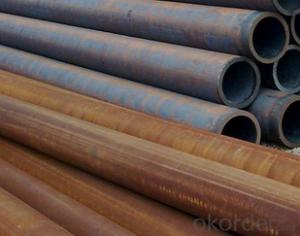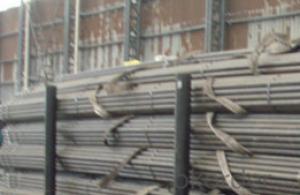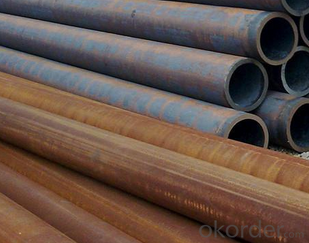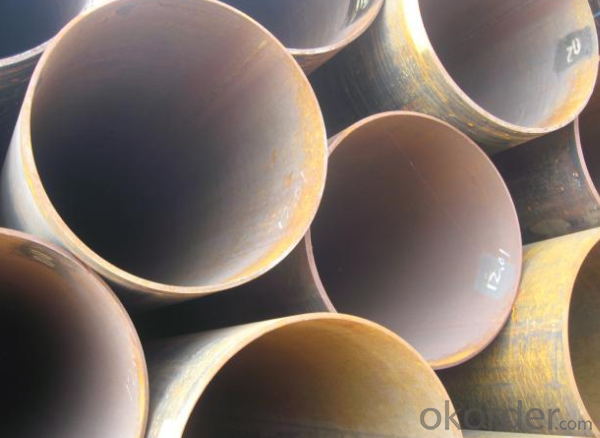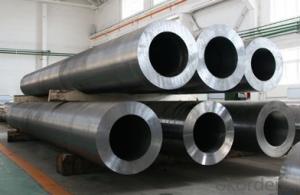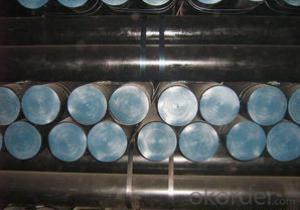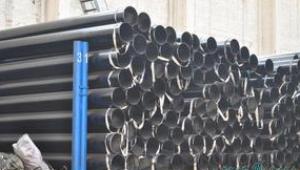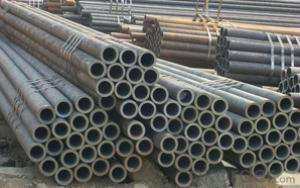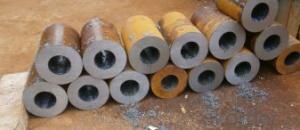Cold Drawn Carbon Steel Seamless Pipe A335 CNBM
- Loading Port:
- Qingdao
- Payment Terms:
- TT OR LC
- Min Order Qty:
- 10 pc
- Supply Capability:
- 30 pc/month
OKorder Service Pledge
OKorder Financial Service
You Might Also Like
Quick Details
| Thickness: | 1.2 - 20 mm | Section Shape: | Round | Outer Diameter: | 12.7 - 168 mm |
| Secondary Or Not: | Non-secondary | Application: | Boiler Pipe | ||
| Technique: | Cold Drawn | Certification: | PED | Surface Treatment: | oil coating |
| Special Pipe: | Thick Wall Pipe | Alloy Or Not: | Is Alloy | ASTM A213: | T2,T5,T9,T11,T12,T22,T23,T91,T91 |
| ASTM A335: | P1,P2,P5,P9,P11,P12,P22,P23,P91,P92 | DIN17175: | 15Mo3,10CrMo910,12CrMo195,13CrMo44 | Grade: | 12Cr1MoV,Cr5Mo,Cr9Mo,12Cr1MoVG,Cr5MoG,A335 P11,A335 P5,A335 P9,A335 P1,A213,A192,A210,A335 P12,A335 P23,St35.8,Cr-Mo alloy,A53-A369,ST35-ST52 |
| Standard: | BS 3059-2,DIN EN 10216-1-2004,DIN 17175,ASTM A213-2001,ANSI A210-1996,ASTM A179-1990,BS,DIN,ASTM |
Packaging & Delivery
| Packaging Detail: | Seaworthy export packing |
| Delivery Detail: | 45 Days |
Specifications
Standard:ASTM A179,DIN17175
Material:SA179,ST35.8
Size:12*1.2-168*20
Manufacture:cold drawn
Heat treating: normalized
Product Description
Commodity: cold drawn carbon steel seamless pipe
Standard&material: ASTM A213 T2,T5,T9,T11,T12,T22,T23,T91,T92, ASTM A335 P1,P2,P5,P9,P11,P12,P22,P23,P91,P92, DIN17175 15Mo3,10CrMo910,12CrMo195,13CrMo44, and equivalent standard and material.
Size range: 12mm*1.2mm - 168mm*20mm
Manufacture method: cold rolled, cold drawn
Delivery condition: Normalized, Normalized and Tempered.
Mill test certificate as per EN10204 3.1B is available.
Third party inspection is acceptable.
Tubes will be ECT+UT.
Packaging & Shipping
Packing: tubes will be packed in bundles tied with steel strips.
Oil coating,varnish,or black painting to be confirmed.
End plastic caps to be confirmed.
External packing by knit bags.
Marking: to be confirmed.
- Q: 304 stainless steel tube with the diameter of 25*2-3 is what mean
- This is according to the "water drawing standards" (GBT50106-2001) in 2.4.2-2 seamless steel pipe, welded steel pipe (straight or spiral seam), brass, stainless steel pipe, pipe diameter should be D diameter * thickness representation (such as D108 * 4 and D159 * 4.5); and the provisions of the habit of acting D with seamless pipe diameter.
- Q: What materials are used in scaffolding pipes?
- Fastener warranty information should be complete, enter the site should be carried out after re sampling technology, performance shall be in accordance with provisions of the "GB15831" steel pipe scaffold fastener, before use should be individually selected, cracks, deformation, bolt slide wire is strictly prohibited.
- Q: How do you calculate the pipe pressure drop for steel pipes?
- To determine the pressure drop in steel pipes, there are two equations that can be utilized: the Darcy-Weisbach equation and the Hazen-Williams equation. The Darcy-Weisbach equation, although more precise, necessitates a greater amount of information. It takes into consideration the diameter, length, roughness, fluid flow rate, as well as fluid properties like viscosity and density. The equation is expressed as: To calculate the pressure drop (ΔP), the following formula can be used: (f * L * ρ * V^2) / (2 * D) In this formula: - ΔP denotes the pressure drop - f represents the friction factor (which can be determined using Moody's chart or empirical equations such as the Colebrook-White equation) - L signifies the length of the pipe - ρ denotes the fluid density - V represents the fluid velocity - D signifies the pipe diameter On the other hand, the Hazen-Williams equation is a simplified version commonly employed for water flow calculations. Although less accurate, it is more user-friendly. The equation is expressed as: To calculate the pressure drop (ΔP), the following formula can be used: K * Q^1.85 / (C^1.85 * d^4.87) In this formula: - ΔP denotes the pressure drop - K signifies the Hazen-Williams coefficient (which relies on the pipe material and roughness) - Q represents the flow rate - C signifies the Hazen-Williams roughness coefficient - d denotes the pipe diameter It is crucial to note that these equations provide estimations of the pressure drop, and actual conditions may vary due to factors such as fittings, bends, and valves in the pipe system. Furthermore, consistency in unit usage (e.g., SI units or US customary units) is of utmost importance when employing these equations.
- Q: How are steel pipes used in railway infrastructure?
- Steel pipes are used in railway infrastructure for various purposes such as constructing bridges, tunnels, and track supports. They are also used for drainage systems, signaling and telecommunication cables, and as conduits for electrical wiring.
- Q: How are steel pipes protected against corrosion?
- Steel pipes are protected against corrosion through various methods such as coating them with protective materials like paint or epoxy, galvanizing them with a zinc coating, or using cathodic protection techniques such as sacrificial anodes or impressed current systems.
- Q: How do you transport and store steel pipes?
- Steel pipes are typically transported using trucks, railcars, or ships. They are stored in designated areas or warehouses, either vertically or horizontally depending on their size and weight. It is important to ensure proper packaging, lifting equipment, and securing methods during transport to prevent damage or accidents. Additionally, storing steel pipes in dry, well-ventilated areas away from moisture and corrosive substances helps maintain their quality and longevity.
- Q: How do you repair a damaged steel pipe?
- To repair a damaged steel pipe, you can follow a few steps. First, identify the extent of the damage, such as cracks or holes. Next, clean the damaged area using a wire brush or sandpaper to remove any rust, debris, or old paint. Then, apply a suitable epoxy or sealing compound to seal the crack or hole. For larger damages, welding or brazing may be necessary. Finally, ensure the repaired area is dry and properly cured before testing the pipe for leaks or further issues.
- Q: Can the KBG25 steel tube hold 4 six types of cables?
- Over five types of cables, the outer cross section is about 24 square millimeters, over six types of network cable for the outer cross section of about 35 square millimeters, so 35*4/490=28.57%, far more than 20%. Therefore, according to the norm, only 3 super six categories can be worn. If the distance is short and the joint is not enough, it can be laid like this, but it does not conform to the construction standard
- Q: Fastener type steel pipe scaffold steel pipe wall thickness
- According to the "construction of fastener type steel pipe scaffold safety technical specifications JGJ130-2011" stipulates that the specification of steel pipe should be Phi 48.3 * 3.6, that is, wall thickness is 3.6mm. The standards in Shanghai are in line with national standards and 3.25mm can be used.Shelf tubes commonly used specifications, sizes are generally 48.3x3.0, 48.3x3.25, 48.3x3.5.
- Q: What are the safety precautions to consider when working with steel pipes?
- When working with steel pipes, it is important to consider several safety precautions. First, always wear personal protective equipment, including gloves, safety glasses, and steel-toed boots to protect against potential injuries. Additionally, ensure that the work area is clear of any tripping hazards and that all tools and equipment are in good working condition. It is crucial to follow proper lifting techniques and use machinery or equipment, such as cranes or forklifts, to move heavy steel pipes to prevent strains or injuries. Furthermore, be cautious of potential fire hazards by keeping flammable materials away from the work area and having fire extinguishers readily available. Finally, regularly inspect the steel pipes for any defects or damages, as working with compromised pipes can pose significant risks.
Send your message to us
Cold Drawn Carbon Steel Seamless Pipe A335 CNBM
- Loading Port:
- Qingdao
- Payment Terms:
- TT OR LC
- Min Order Qty:
- 10 pc
- Supply Capability:
- 30 pc/month
OKorder Service Pledge
OKorder Financial Service
Similar products
Hot products
Hot Searches
Related keywords
